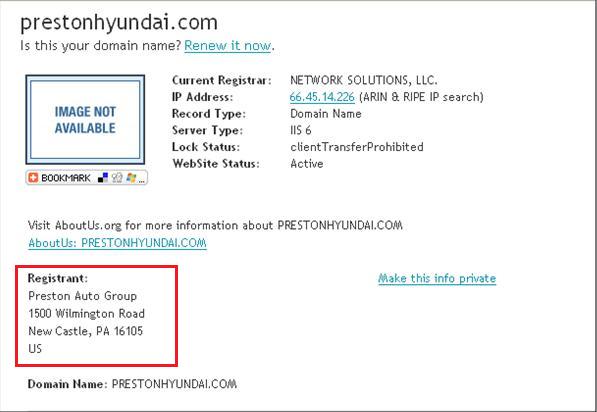Since DealerOn’s core service is our website product, we work with hundreds of dealers’ domains every day, and consider ourselves fairly expert in this area. Dealers and their IT people may not always have much experience in this area– for most online companies, the only time you need to worry about your domain is when you register or renew it, UNLESS you’re about to lose your domain, and then you REALLY have to worry about your domain.
Your domain is your online brand and you have likely spent years, countless hours, and millions of dollars building the value of your domain name. You’ve advertised your domain in print, TV, radio, search engines, online banner ads, email marketing campaigns, social media sites, and in online directories. While the original selection of your domain may have been arbitrary, after building your domain brand for 15 years or more, it is now too valuable for you to lose.
Nevertheless, not a month goes by where I don’t talk to a dealership that’s in some jeopardy of having their ability to use a domain seriously impaired. I’m going to briefly discuss your rights and recourse if your dealership ever finds itself in this situation and what you can do right now to ensure it doesn’t happen to you in the future.
Your Rights:
Your dealership has a valid legal claim to any domain name that someone has registered on your behalf while acting as your agent, UNLESS your website company’s contract or service agreement specifically states otherwise. If you change website providers, you should not have any issue getting your prior provider to release your domains for transfer if they happen to be managing it or if they have registered it on your behalf. DealerOn, for instance, does not prevent any current customer from transferring their domains, nor do we use any legal language impairing your ability to do so. Your website company should not have any language in either their user agreement or their contract language providing them legal claim to your domain.
If your provider has legal control over your domain (they are listed as the registrant), and they refuse to transfer your domain for any reason, you should be aware of your rights. First, they cannot put up a website themselves (see the Anti Cybersquatting Consumer Protection Act) that in any way allows them or their registrar to profit from the website (this includes “parked pages” which usually have ads running on them). These limits make it practically worthless for someone outside of your dealership to have control over the domain; they can only spite you by holding it. The only instance in which they could continue using an active site on a domain you had been using in the past is if it contained only brand-agnostic words (EG- unitedstatesusedcars.com).
Your Recourse:
If you do get in a dispute with a website provider, marketing agency, former employee, or anyone else over a domain, there are many options available to you:
- Contact the Registrar directly– If you can demonstrate to a Registrar (Go Daddy, Network Solutions, etc) that your business is clearly the business that should be in control of the domain (EG-your dealership is Cavalier Ford Lincoln and the domain is cavalierfordlincoln.com), the Registrar will have a process that you can go through to re-claim your domain. It will usually require you to provide your letterhead, and document your state business license, among other things. The Registrar has an incentive to help ensure that cybersquatting is not rewarded.
- Submit a formal UDRP complaint to the Registrar – Registrars are required by ICANN to follow the Uniform Domain Name Resolution Policy (UDRP). If a company is “cybersquatting” on your domain or holding it hostage, you should submit a formal complaint.
- File a Federal Court Action or administrative proceeding to compel the company to turn the domain over to your dealership.
According to Mike Steger, a leading Intellectual Property Attorney, neither of the above processes will usually take more than a couple months, nor cost more than a few thousand dollars (which you may recover from the defendant). Both the time and cost involved will likely pale in comparison to the time and effort you’ve put in to building your online brand.
What you can do RIGHT NOW
For every domain that your dealership uses, your dealership should be the listed “Registrant”. You want to make sure that even if your marketing agency, your website provider, your IT director, or your Internet sales manager is the technical or administrative contact for your domain, that your dealership or ownership company is still the listed “Registrant”. You can check the legal Registrant for your domains on any accredited Registrar’s website. Here are a few good ones:
Here’s an example from networksolutions.com/whois/index.jsp
 Before you sign a website agreement with any provider, make sure you have a clear understanding of their policies regarding owning and controlling your dealership’s domain name. Losing a URL that your dealership has built could cost your dealership millions of dollars to rebuild your online brand.
Before you sign a website agreement with any provider, make sure you have a clear understanding of their policies regarding owning and controlling your dealership’s domain name. Losing a URL that your dealership has built could cost your dealership millions of dollars to rebuild your online brand.





